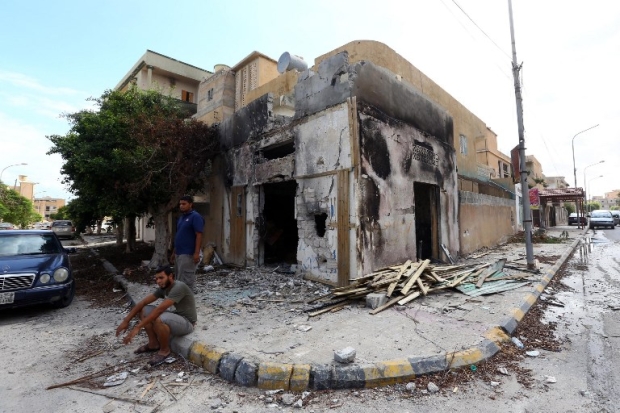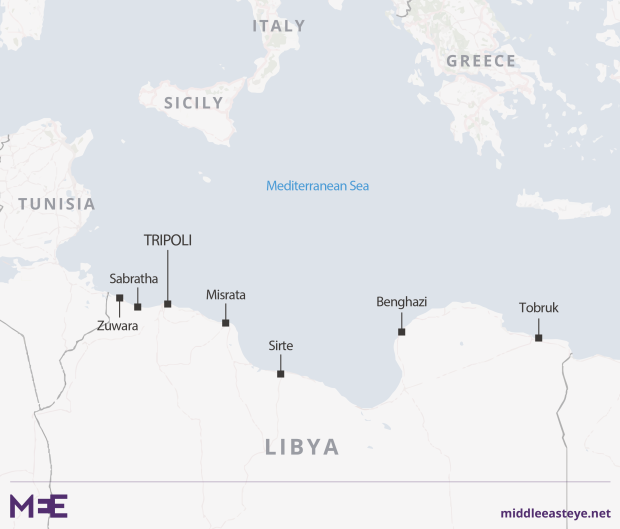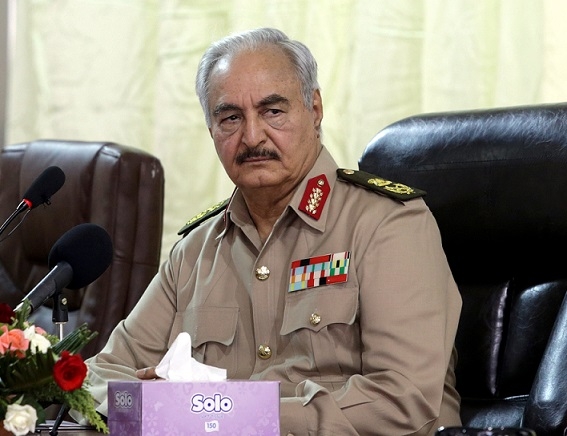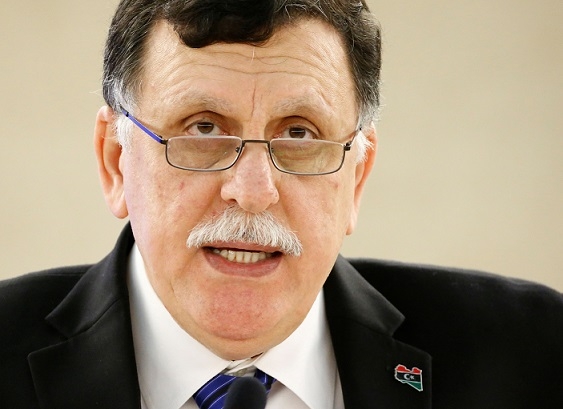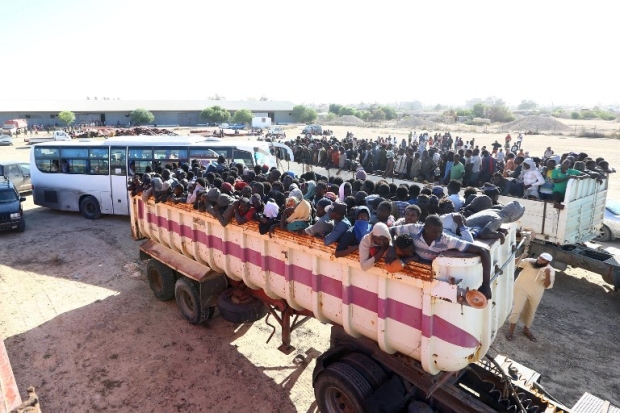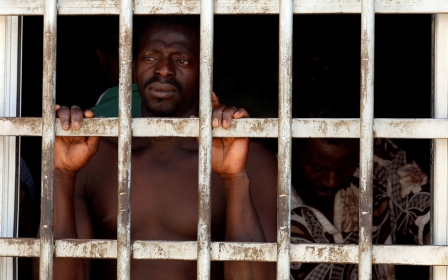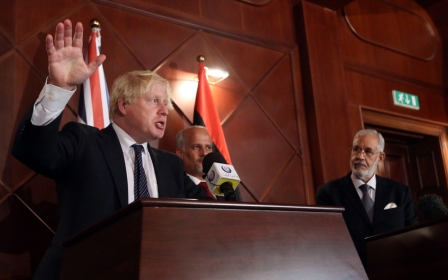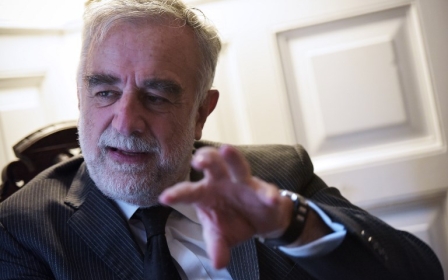ANALYSIS: After Sabratha battle, scramble for western Libya is on
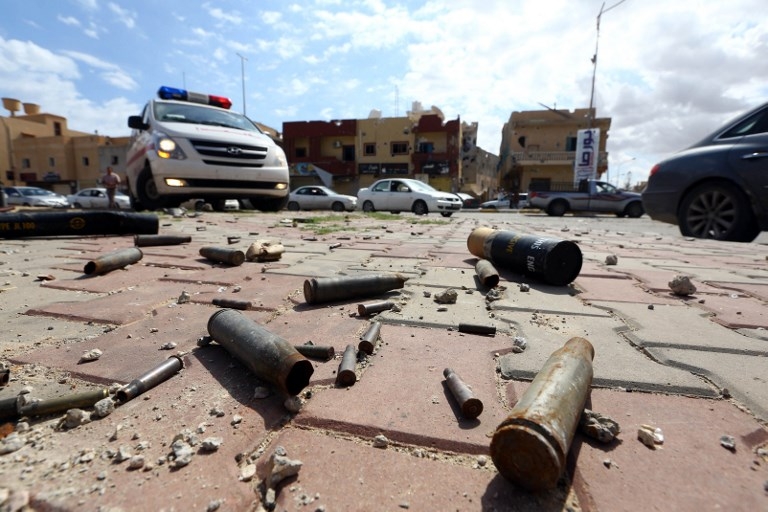
When a multi-million dollar Italian effort to stem migration from western Libya backfired and fuelled deadly clashes earlier this month, it brought together an odd set of alliances that could shape the future of the country.
As the dust settles around Sabratha, perhaps the oddest alliance formed during the fighting is that between general Khalifa Haftar, the strongman whose self-styled Libyan National Army (LNA) has been fighting Islamists and others in the east, with the Al-Wadi Brigade, a local militia in the west formed of Salafi fighters.
If defeating the Dabashi militia will bring other fundamentalists masked by armed forces here at Sabratha, the situation could become very dangerous
- Fasi, resident of Sabratha
“The war will not stop until those groups hand over their weapons, release people arrested for blackmail and hand over foreign fighters who are fighting with them,” Haftar said on 3 October announcing his involvement.
Residents say they are watching these alliances closely. Since the start of the war in 2011, they have seen their city change hands several times, at one time falling under the control of the Islamic State group.
Having lived through years of fighting and air strikes, they are anxious to see which group will take control of the area and who will become the interlocutor of Western governments, receiving weapons and money.
“A growing number of people have realised that militias are just dangerous and they have started to put more faith in ‘strong men’ like Haftar.”
But which groups, Fasi asked, might these strong men align with in the end?
Standstill to standoff
Until two months ago, Sabratha was Libya’s capital of human trafficking, a widespread and lucrative trade among many Libyan gangs and militias.
This changed, however, in late August when trade came to a standstill after armed groups that had been profiting off migration started to stop boats from leaving the country in exchange for aid, aircraft hangars and five million euros from Italy, Libyan security officials told Middle East Eye. The Italians have denied the account.
Locals sources, however, say the Italian payoffs fed tensions between the paid militias – the Dabashi clan and Brigade 48, both affiliated with the UN-backed government - and other groups still attempting to profit off migrants."This war began as a war between traffickers, then became an ideological and political war," said al-Tahar al-Gharabili, head of the Sabratha military council that is under the control of the UN-backed government.
During the first week of October, Dabashi and Brigade 48 fought against the Operation Room – the anti-Islamic State coalition in the area – backed by the Al-Wadi Brigade.
By 6 October, when the Operation Room claimed victory and said it had captured Sabratha, at least 30 people had been killed (with some reporting almost 100) and about 150 were wounded.
Competing interests
With its victory, observers say the Operation Room has been trying to portray itself to Western powers as the only security force capable of maintaining order in the country.
“Currently, the Operation Room is not trying to appear like just another militia – a replacement to the Dabashi militia – but as a new police force and a new army, replacing the militias altogether,” said Mattia Toaldo, a senior policy fellow with the European Council on Foreign Relation in London.
This war began as a war between traffickers, then became an ideological and political war
- Tahar al-Gharabili, head of Sabratha military council
Haftar, he added, “has made giant strides in recent months” and now has France and Italy competing for his favour.
A week after the battle ended, Haftar recorded a video, posted on his Operation Dignity's general command, saying that his forces control the coastal area between Zuwara and Zawiya, with Sabratha in the middle. He added that they would seize Zawiya city - a few kilometres from Tripoli - in the coming days.
One of the ways they have attempted to present this image, Toaldo said, was by “theatrically inviting the media into the illegal detention centres run by the Dabashi militia, and showing them the thousands of migrants being held there”.
The outcomes of the Sabratha fight have also revealed some contradictions in the field. The Al-Wadi Brigade, said analysts, is a striking example.
The force is made up of Madkhalist Salafis, followers of the Saudi Sheikh Rabi al-Madkhali who preaches the emulation of the life of the Prophet.
The Operation Room 'has been very careful' to stay neutral between Serraj and Haftar in recent weeks, but it’s no secret that it has good relations with the Al-Wadi Brigade and Haftar, said one analyst
Under Muammar Gaddafi, the group was allowed to remain active because it rejected elections and democracy and called for obedience towards authority, according to analyst Ahmed Sala Ali writing in June for the Atlantic Council.
When Haftar launched Operation Dignity, his campaign to defeat militants in Benghazi in 2014, al-Madkhali issued a fatwa calling on his followers to support the renegade general against the Muslim Brotherhood which he called the “evil from Gaddafi”.
But their alliances may be more strategic than ideological, said analysts.
"The Madkhalite Salafists in Libya always go where the power lies,” Toaldo said. “They support Haftar in the east, but also [prime minister of the UN-backed government Fayez al-] Serraj in Tripoli and, in the war to liberate Sirte from IS, they were technically independent but came under Misrata forces.”
Equally, Haftar’s alliance with the fighters reveals contradictions in his narrative, writes Ali.
The general may denounce his opponents as "takfiri terrorists and Kharijites" and accuse them of employing political Islam, embracing the Muslim Brotherhood, IS and Ansar al-Sharia, but "he also has strong ties to Salafist organisations that are part of the forces fighting under his command in Barqa in eastern Libya".
'Life has become a hell'
As the constellation of militia alliances shifts, the latest battle over Sabratha is just another chapter of being caught in the middle of armed militias vying for power and influence, said Fasi, the Sabratha resident.
In the beginning of the war, he said, the militias were only engaging in illegal trafficking. But increasingly, they have realised that they needed to become part of local governing structures to provide coverage and political support for their projects and illegal affairs, including trafficking.
“Since then, our life has become a hell,” he said.
It’s not only residents caught in the middle, but also thousands of migrants who were displaced and found trapped in camps after the militias paid by the Italians stopped their boats.
Is there more fighting to come? Will Haftar – in alliance with the Operation Room and the Al-Wadi Brigades - take control of the west of Libya?
“Sabratha’s military war is over,” Fasi said, “but the diplomatic war has just begun.”
Haftar, he said, has realised that Western governments are increasingly dubious about backing militias and want someone like him in charge – but that’s not necessarily what locals want.
“There are other dangers around the corner because the Wadi Brigades are dangerous people – they want to control the religious and public life of the country as they do in Cirenaica,” he said, referring to eastern Libya where Haftar's forces are in control.
“If defeating the Dabashi militia will bring other fundamentalists masked by armed forces here to Sabratha, the situation could become very dangerous. It will be the beginning of the next civil war."
This article is available in French on Middle East Eye French edition.
Middle East Eye propose une couverture et une analyse indépendantes et incomparables du Moyen-Orient, de l’Afrique du Nord et d’autres régions du monde. Pour en savoir plus sur la reprise de ce contenu et les frais qui s’appliquent, veuillez remplir ce formulaire [en anglais]. Pour en savoir plus sur MEE, cliquez ici [en anglais].


